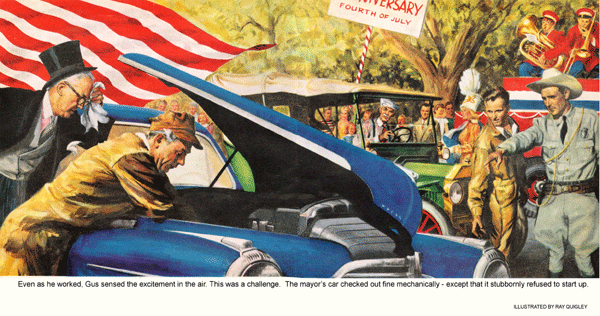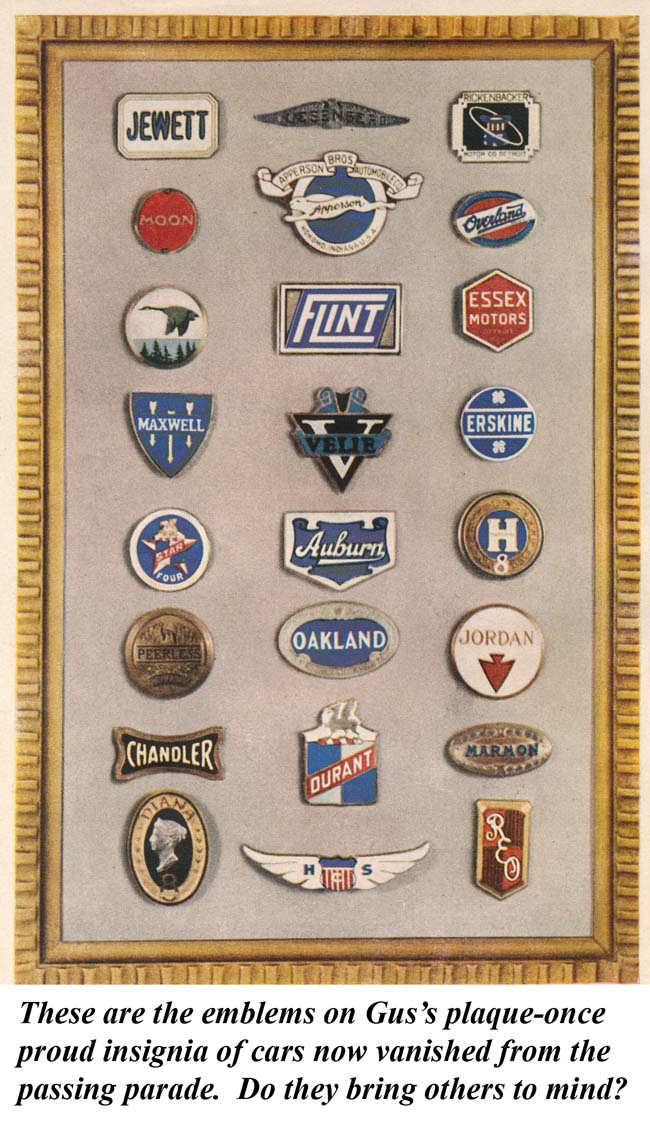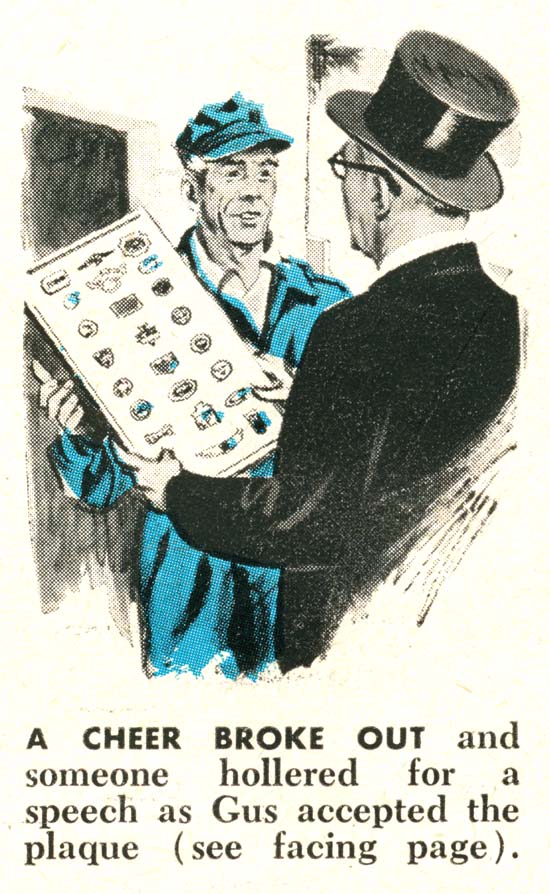July 1955
GUS TURNS BACK THE CLOCK
by Martin Bunn
The proprietor of the Model Garage
thought that he was going fishing.
Instead, he found himself
on the spot-trouble-shooting a car
while the whole town watched.

"In precisely one hour," Gus Wilson announced. "I'm going to take the day off."
He and Stan Hicks were opening the Model Garage. Gus hadn't the faintest inkling that something was in the wind.
For him it was simply eight in the morning on a July day that promised to be just right for sitting on a shady riverbank.
Besides it was the Fourth of July.
"We have the mayor's car to tune," Stan reminded him, almost too quickly.
Gus knocked the ashes from his pipe as he entered the cool interior. "One hundred and seventy-nine years ago today," he said, "our forefathers declared their independence of a tyrant king. I intend to celebrate by declaring my independence of a tyrant mayor." His eyes twinkled as he observed Stan's worried expression.
"But, Gus," the latter protested, "the mayor made a big point of wanting it done this morning. And we agreed."
"You agreed," Gus reminded him.
"And the only thing, "he continued with mock gruffness, "that puzzles me more than the mayor wanting his car tuned on the Fourth of July is your willingness to do it."
Stan looked down and shuffled his feet. Had Gus a suspicious nature he would have suspected right then that Stan was up to something. But Gus, though shrewd, never suspected friends of trickery.
"Besides," he went on, "you can handle the job. No need for me to hang around."
A look of alarm suffused Stan's face.
"But, Gus, I -- er -- might find something really wrong and need you to give me a hand with it."
This time Gus looked at his assistant sharply. "Since when have you voluntarily admitted that you weren't the world's No. 1 mechanical genius?" Just then the phone rang and to Stan's relief, Gus went to the office to answer it.
In a minute he was back. "That was Jerry Corcoran, with whom I have an engagement to go fishing."
Stan paused in the process of donning his coveralls.
"N-not this morning," he quavered.
Gus was oblivious to his assistant's odd behavior. He answered, simply. "Apparently not." His voice reflected his disappointment. "Now he tells me that he can't get off until noon." Misreading the look of satisfaction on Stan's face, Gus continued. "But I'm not going to do any work. In fact," he exclaimed. "I'm going to spend the morning doing something I've been wanting to do for months, I'm going to clean out the storage room." He turned on his heel and was gone.
Gus's storage room is a small space off his stock room in which he puts things he can't bear to throw away -- used automobile parts, bills, and correspondence. It had become increasingly evident that more space was needed. The oldest of the bills and records must go. Gus had resolved.
He set to with a will and began hauling boxes out into the stock room. He was dragging a particularly big, dust-covered one when the twine with which it was wrapped broke and the contents spilled to the floor. Gus stooped to pick them up and his eye lighted on the top sheet of a neatly wrapped bundle. It was dated July, 1941, made out to Mr. Griggs, the director of the First National Bank. A new muffler. Gus sat down on one of the cartons and stared at the bill, a slow smile playing around his mouth.
It was funny how that piece of paper took him back. He filled his pipe and almost chuckled out loud as he recalled the expression on the crusty old banker's face when he learned that a new muffler would cure his brake trouble. Mr. Griggs had brought his car to the Model Garage because he couldn't get the brakes to work without pumping. Gus had gone all over the whole hydraulic systems without finding anything wrong. Then he had noticed a tiny hole in the muffler right beside the tubing that carried brake fluid. He had reasoned correctly that the heat escaping from this hole was vaporizing the fluid, causing the soft pedal.
Gus began thumbing through the old bills. His resolve to tidy up the storage room was forgotten.
His reveries were interrupted by the appearance of a harassed-looking Stan Hicks. "Gus," he blurted, "there's a -- er -- fellow out front whose car won't start. But everything checks okay. What do you think I should do?"
Gus sighed. "I'll go and take a look."
"No!" cried Stan. "You stay right here. This is your day of rest. I'll take care of it. Just tell me what to do."
What is the matter with the lad, today? Gus thought to himself. He's certainly flustered about something. But he was enjoying his ramble through the past so much that he decided to let him have his way. "How did he get it over here?" he asked.
"Push start."
"How did it sound when it was running? Any signs of missing?"
"Nope. Sounded good."
"What have you done so far?"
The young mechanic ticked off on his fingers; "Plenty of gas at the pump and the carburetor. No sign of an intermittent stoppage. Not hot enough for vapor lock. Checked the points and the condenser. No trouble there. Plugs are okay."
"Did you check the coil and plug leads to see if there was a break in the continuity?" Gus asked.
"Will do," said Stan and he returned to the front of the garage. Gus watched him fondly. Stan had come a long way since that day in -- when was it now? He recalled vividly the day Stan had come to work for him. He began looking through the bills. Yes, here it was, November 15, 1943. Stan's boyish signature on a service order. Yes, sir, he had become quite a mechanic.
Gus was aware that someone was reading over his shoulder. He looked up and saw Jerry Corcoran, the state trooper, still in his uniform.
"Hi!" said Gus. "Say, I thought we were going fishing. Why didn't you get into your old clothes?"
Jerry hesitates. "Well, you see -- well, I can't go just yet. I'm -- well -- I'm sort of still on duty."
Gus couldn't hide his disappointment.
"You mean no fishing for us today."
"That's about it," Jerry said uncomfortably. "Not for a while anyway," Gus started to get up.
"What are you doing?" Jerry asked him quickly. "Going through some old records? Let me see some of them."
"You wouldn't be interested in these," Gus said.
"Oh, yes I would," Jerry said, seating himself beside Gus. "Do you remember the time -- it must have been 10 years ago -- when you and I were fishing and the gypsy stole your battery right out of your car."
Gus laughed. "He thought we couldn't catch him without a battery."
"But you wrapped the cable with your handkerchief to keep it from shorting. I gave you a push to get the car started, the generator furnished ignition juice, and we caught up with the thief. Was he ever surprised!"
Stan Hicks appeared again. He was flushed covered with grease, and worried. He exchanged a glance, which Gus didn't see, with Jerry Corcoran.
"I checked the plug leads and there's no break in continuity," he said. "What do you suggest I do now?"
"I suggest I take a look at it," Gus said.
"No!" both Stan and Jerry exclaimed together. Gus looked at them.
"What's the matter with you guys?"
"Nothing," Jerry said.
"Nothing at all," Stan rejoined hastily. "I'll take a look at the coil. That's probably where the trouble is." And he darted away. Gus made as though to follow him, but Jerry said. "How far back do these records go?" and in another minute Gus had forgotten the customer out front as he and Jerry dug into the old files.
"Here's a good one," Gus said, holding up a bill dated July 20, 1930.
"Twenty-five years ago. Do I remember this fellow! He had bought a gadget that was supposed to increase gas mileage by letting more air into the manifold. He kept stalling on hills and came in to me to find out what was the matter. I told him what was wrong with his gadget and then --" Gus laughed," and then I looked into my crystal ball and told him that it would be impossible to invent something that would automatically lean out or richen the mixture."
"But isn't that sort of what an automatic choke does now?" Jerry asked.
"Yup," said Gus. "I hope I'm a better mechanic than I am a prophet."
Jerry held up a bunch of bills which were beginning to get brittle and yellow.
"These go way back."
Gus thumbed through them. "Nineteen twenty-five. H-m-m. December, October, August, July." He paused at the last bill in the pile. He looked up at Jerry. "Well, what do you know!
"Today is an anniversary! This is -- why, this is my thirtieth year in business here. Look." He proffered the bill he was holding in his hand. "See? The first Model Garage bill. It was for Mr. Stevens. Tune-up and checking over his car before he went on a trip. I remember it as clear --" He looked at his friend and stopped, Jerry's face was contorted with mirth. He was struggling to keep from laughing. "What in tarnation is the matter with you?' Gus demanded.
At this juncture Stan Hicks reappeared for the third time. "Do we have a distributor for a '41 Buick?"
"Nope," Gus told him. "Haven't you found that fellow's trouble yet?"
"It must be his distributor."
"I'll take a look at it," Gus said.
"Oh, no!" Stan began in a panic, but Jerry Corcoran interrupted him.
"It's no use, boy," he said. "Gus has just discovered that this is his anniversary. We can't stall him off any longer."
Gus looked from one to the other sharply. "What are you two talking about? What are you up to?"
Stan said, "Ulp!" and darted away. Jerry took Gus by the arm. "It's about this thirtieth anniversary of yours."
"Yes?" said Gus. "What about it?"
"You were the last person in town to know about it."
He guided Gus firmly through the stock room and the garage. Gus could see what looked like a lot of cars and people out front. As he appeared in the doorway, a tremendous cheer broke out. Gus stopped, blinked his eyes and looked again. Stretching from his garage as far as he could see down the highway were cars, covered with streamers and bunting, interrupted with floats. And people! The whole town seemed to be there. And they were cheering him, waving their hats and calling his name. Signs on the cars and floats read: YEA, GUS! And THE FIRST THIRTY YEARS ARE THE HARDEST, and there were others.
The mayor, resplendent in a cutaway coat (slightly too large) and a silk top hat (slightly too small), was smoothing his waistcoat, mopping his forehead, and trying not to look as if anything had gone wrong. Behind him were half a dozen of the town's leading citizens. The mayor stepped forward with something in his hands. The crowd fell silent.
"Mr. Wilson," the mayor began, in his best oratorical manner, "on behalf of the citizens of our town --" He paused and looked helplessly about him. All at once he dropped the formality. "Oh, for the love of Pete!" he exploded. "Gus, it wasn't supposed to be like this. We had planned to whisk you into my car, lead the parade downtown, and make the speeches and presentation there."
"Speeches?" asked Gus, now completely bewildered.
"Yes, you old son of a gun! This is your day, I have officially proclaimed this Gus Wilson Day, in honor of the town's No. 1 citizen. And to commemorate it we want to present you with this plaque of old-car emblems for your office wall."
A cheer broke out as Gus dazedly accepted the plaque from the mayor. Someone hollered for a speech, and the crowd took it up. Gus demurred, but the mayor and Jerry Corcoran led him firmly to a bunting-covered truck and hoisted him up.
For a moment, Gus stood there. His eyes were moist as he looked down at his feet and shifted his pipe in one work-worn hand. Finally he looked up and squared his shoulders.
"Friends and neighbors," he began.
"This a great honor you have bestowed on me. This kind of a turnout doesn't usually happen except at a funeral, and I don't think I'm dead yet." That got an appreciative laugh. "Though I liked to have died," he went on, "when I stepped out and saw all you people standing here, I knew business had gotten better, but I didn't think it was that good.
"Seriously, though, 30 years seems a long time when you look back, until you think of them as being years of friendship and accomplishment. Then it isn't long enough. I've made a lot of friends since opening the Model Garage. I've learned a lot about people and a lot about cars. Cars are like people, you know. Treat 'em right and they'll seldom let you down. That's all I have to say, except -- well -- thanks a lot!" The crowd applauded wildly and Gus jumped to the ground. The mayor shook his hand.
"Terrific, Gus!" he exclaimed.
"Thanks."
"Now there's just one thing . . . "
"What is it?" Gus asked.
"Do you think you could get my car started so we can get on with the parade?" Gus joined in the laughter.
"It serves you right," he said, "for entering into this conspiracy. I might have known there was something fishy when you wanted your car tuned up on the Fourth of July. And I should have suspected that Stan Hicks was up to something this morning."
Stan colored with embarrassment. "I thought I could fix it," he said, as they walked to the mayor's car at the head of the line. "But it's a real stumper."
Someone in the crowd yelled, "Maybe it's out of gas.
When the laughter had subsided, the mayor retorted indignantly. "Even I've got enough sense to check that."
Meanwhile Gus was going over the ignition system with sharp eyes and deft fingers. "The spark at the coil is weak, but there is one. H-m-m. Sure looks like distributor trouble."
"Then we're sunk," said Stan.
"Help me pull this distributor," Gus ordered. "I have an idea." The two men worked swiftly while the crowd gathered.
Even as he worked, Gus sensed something in the air. A feeling of excitement. This was a challenge. On his thirtieth anniversary -- on Gus Wilson Day -- he was being given a real test of his ability. Gus was the champ defending his crown and the whole town was out to watch him do it. A tingle of excitement ran up Gus's spine. Would his hunch work? Would he vindicate the townspeople's faith in him? Somehow he knew he must or it would spoil the day.
In a very short time the distributor was stripped down. Gus examined it thoroughly. Then his heart gave a little extra beat. Luck was with him!
"I think we can fix it," he muttered.
Word was passed along and a cheer went up. "Bring me a shim," he told Stan.
A few minutes later the distributor was back in the car, the engine was purring like a baby, and the parade was at last under way, Stan and Gus were sitting in the back of the mayor's car.
Amid horn honking shouts, laughter, and general merriment, Stan leaned over to Gus. "You're still the old master."
"Thanks, son," Gus replied.
"What was it?" Stan asked. "Or is it a professional secret?"
"Not at all," Gus said. "What happened was that the shaft on which the rotor arm sits was worn. When the distributor was moved in retiming, the rotor arm settled back so low that it didn't get the spark to the cap studs at cranking speeds. At least that's what I guessed.
So I put the shim in, lifting the rotor arm a trifle. It did the trick."
They rode along without speaking for a while. Finally Stan said, "I hope you won't have to wait another 30 years for another day off."
Gus chuckled. "You know, when you like what you do for a living as much as I do, every day is a holiday."
END

